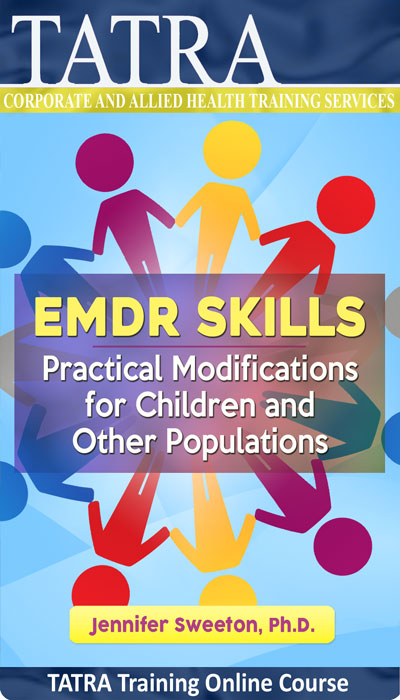04 Feb EMDR Skills: Practical Modifications for Children & Other Populations

Many courses teach clinicians how to conduct EMDR with adults, however very few seminars focus on EMDR modifications for children, leading some clinicians to feel hesitant about using these evidence-based skills with young clients who may greatly benefit from them!
EMDR is effective and well supported by research evidence for treating children with symptoms accompanying posttraumatic stress, attachment issues, dissociation, and self-regulation. It has also been effective in treating symptoms related to anger, depression, and anxiety, and can be used to boost emotional resources such as confidence and self-esteem.
During the past five years, the World Health Organization recommended two psychotherapies for children, adolescents, and adults with PTSD: trauma-focused cognitive behavioural therapy and EMDR. Of the two modalities, some of the research describes EMDR as “significantly more efficient.”
This three-hour seminar focuses on practical EMDR skills for the treatment of children, ages 3-15, who have experienced trauma or psychological injury. It assumes that attendees have completed general/basic EMDR training, and is tailored to clinicians who want to broaden and deepen their EMDR skill set in creative and effective ways. After completing this seminar, attendees will be equipped to help children desensitize to and process distressing memories in a gentle, titrated manner that prioritizes resourcing.


This training will provide participants clinical knowledge and tools to:
- Name two types of trauma treatment therapies that can be used with children.
- Describe at least two differences between conducting EMDR with adults, versus children.
- State how desensitization can be conducted with a 5-year-old.
- State how desensitization can be conducted with a 10-year-old.
- Identify one way to manage dissociation and increase resourcing in children.
- Describe how parents may be involved in EMDR sessions with children.
Target Audience:
The target audience for this event includes psychologists, social workers, counselors, MFT’s, and other clinical mental health professionals.


This online workshop will give you instant access to 2 sessions of video content, accessible via streaming on our website, as well as downloads for supplemental materials. You can view the course content in your own time, there is no time limit on access.
The duration of this workshop is 3 learning hours.
Please click the green ‘Mark Complete’ button on each module as you progress. A certificate of completion will be generated upon finishing the course and completing a short assessment quiz. If the certificate is not showing, please confirm you have marked all sections as ‘Complete’. Please consult your professional organisation/association to confirm whether you are able to claim any CPD points/hours for this online workshop.



 Dr. Jennifer Sweeton is a clinical psychologist, best-selling author, and internationally-recognized expert on anxiety and trauma, and the neuroscience of mental health. She completed her doctoral training at the Stanford University School of Medicine, the Pacific Graduate School of Psychology (now Palo Alto University), and the National Center for PTSD. Additionally, she holds a master’s degree in affective neuroscience from Stanford University, and studied behavioral genetics at Harvard University.
Dr. Jennifer Sweeton is a clinical psychologist, best-selling author, and internationally-recognized expert on anxiety and trauma, and the neuroscience of mental health. She completed her doctoral training at the Stanford University School of Medicine, the Pacific Graduate School of Psychology (now Palo Alto University), and the National Center for PTSD. Additionally, she holds a master’s degree in affective neuroscience from Stanford University, and studied behavioral genetics at Harvard University.